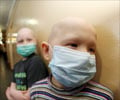Health-care officials are urging people who fear that they are experiencing the symptoms of swine flu-dizziness, headache, and sore throat with a running nose-not to head to hospital
Health-care officials are urging people who fear that they are experiencing the symptoms of swine flu-dizziness, headache, and sore throat with a running nose-not to head to hospital emergency rooms immediately.
They fear that many people panicked by thoughts of H1N1 flu will do just that, and overtax emergency departments' abilities to care for the large number of patients, when there are more chances that their illnesses could be best treated at home."When you are sick with the flu or any other contagious illness, the best thing to do is stay home, rest and avoid contact with other people as much as possible. If you think you have H1N1, call your physician or a health-care advice line first. They can determine if an examination, influenza testing or treatment is needed," said Dr. Mark Cichon, director of emergency medical services at Loyola University Health System in Maywood.
Other than easing the strain on the health-care system, avoiding a visit to an emergency room might even benefit those who think they have the flu, said Dr. Jamie Belmares-Avalos.
Infectious diseases like H1N1 can be easily transmitted from person to person in crowded public places.
"Emergency rooms are prime locations for picking up and passing on germs so avoid it unless you have a real medical emergency," said Belmares-Avalos.
Most of the patients of swine flu, also known as H1N1 flu, will recover from both its varieties in a few days, although they may experience fatigue for several weeks.
Advertisement
There are some warning signs that require emergency medical treatment.
Advertisement
In adults, emergency warning signs include-difficulty breathing or shortness of breath, pain in the chest or abdomen, sudden dizziness and confusion, severe vomiting or diarrhoea, confusion.
"If you have none of those symptoms, you have no need to seek emergency care. A key rule to follow is if you have symptoms that wouldn't normally cause you to go to an emergency room, you probably don't need to go to one. If you still have some concerns, the best thing to do is consult your family practitioner," said Cichon.
Source-ANI
SRM











